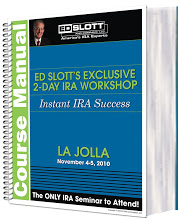What a week of questions! Some great questions turned in by consumers across the country desperate for educated financial guidance. We answered questions about income limits for Roth IRA contributions and inherited 401(k) plans. As always, we stress the importance of working with a competent, educated financial advisor to keep your retirement nest egg safe and secure.
1.
In the July newsletter, you confirmed that the income limit of $100,000 has been eliminated permanently and that everyone, regardless of income, can now convert to a Roth IRA in 2010 and beyond. However, there are still income limits which govern who is eligible to contribute to a Roth IRA. So, if I am over the income limit, can I contribute $5,000 to my traditional IRA and then once it is funded, can I convert it into a Roth IRA every year hence effectively funding a Roth IRA? If this is possible are there any rules or guidelines that I need to be aware of?
Thanks,
Seema Qureshi
Answer:
Yes, there are income limits that still apply to making Roth IRA contributions. If, however, you are over the limit (there are different limits for filing a joint or single tax return and the limits are indexed for inflation each year) you can, if you have earned income, make a non-deductible IRA contribution. The maximum you can contribute in 2010 is $5,000 and if you are age 50 or older by 12/31/10 you can add an additional $1,000 for a total of $6,000. Then you convert an amount equal to the contribution to a Roth IRA. When doing that conversion you must consider all your IRAs to calculate the amount that is taxable. This is known as the pro rata rule.
2.
Dear Slott Report,
My husband and I contributed a large amount of money (we're talking hundreds of thousands) into our Traditional IRA accounts in 2007. We were not apprised by our investment firm of the fact that this is considered an excess contribution and is subject to IRS penalty and interest charges until we attempted to convert our Traditional IRA into a Roth IRA earlier this year. We have already withdrawn the excess contribution (plus earnings) from our IRA account. And we have already paid penalty and interest charges to the IRS for 2007, 2008 and 2009 - a large sum to be sure, but a relatively straightforward 6% plus late penalty plus interest calculation. However, we are quite concerned that we are headed for an extremely large 2010 tax payment in addition to all of this. What kind of options might we have that could help lead us to a lower 2010 tax payment?
Sincerely,
Susan Miller
Answer:
You do not say whether or not you took a tax deduction for your IRA contributions. If you did NOT and you filed Form 8606 with your tax return to report the amount of the after-tax contribution, you may be able to escape paying income tax on the distribution. You need to consult with a tax or financial advisor to explore the options you might have to reduce your 2010 taxable income if possible. Please check our website, www.irahelp.com to locate an advisor near you that is knowledgeable in this area of the tax code.
3.
I inherited my husband's 401(k). My husband's employer changed the name on the account into my name and allowed me to keep the 401(k) account at the company for up to 5 years following my husband's death. I have a 401(k) at my place of employment as well. The 5 years are coming up. What are my options with this inherited 401(k)?
Thanks!
Answer:
Good question and one that we hear often. You can do a trustee to trustee transfer from the company 401(k) plan to an IRA for herself. All of the pre-tax contributions plus earnings can go into the IRA. Any after-tax contributions in the 401(k) plan can be taken out with out any income tax consequence. The other option you may have is if your own 401(k) plan allows amounts from other 401(k) plans to be contributed to it you can do a trustee to trustee transfer into your own 401(k) plan. You must check the plan document or summary plan description to see if this option is allowed.
Just as a reminder to our readers, only a spouse has these options. Non-spouse beneficiaries have very different options.
By IRA Technical Consultant Marvin Rotenberg and Jared Trexler
------------------------------------------------------------------------------
Comment, Question, Discussion Topic on your mind? Click on the Blue Comment Link below and leave your thoughts then check back to see what other consumers and advisors think.
*Copyright 2010 Ed Slott and Company, LLC
Thursday, August 26, 2010
NEW Mailbag Highlights Income Limits
Subscribe to:
Post Comments (Atom)
















0 comments:
Post a Comment